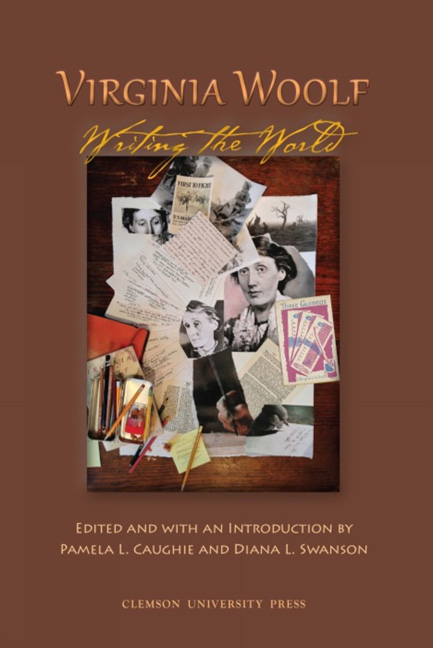Book contents
- Frontmatter
- Table of Contents
- Introduction
- Acknowledgmen
- Abbreviation
- WAR AND PEACE
- WORLD WRITER(S)
- ANIMAL AND NATURAL WORLD
- WRITING AND WORLDMAKING
- Negative Feminism and Anti-Development in Virginia Woolf's The Voyage Out
- Upheavals of Intimacy in To the Lighthouse
- The Reconciliations of Poetry in Virginia Woolf's Between the Acts; or, Why It's “perfectly ridiculous to call it a novel”
- Virginia Woolf, Composition Theorist: How Imagined Audiences Can Wreck a Writer
- The Precarity of “Civilization” in Woolf's Creative Worldmaking
- Notes on Contributors
- Conference Program
- Appendix: Virginia Woolf Conference Exhibit Items, Newberry Library
The Reconciliations of Poetry in Virginia Woolf's Between the Acts; or, Why It's “perfectly ridiculous to call it a novel”
from WRITING AND WORLDMAKING
- Frontmatter
- Table of Contents
- Introduction
- Acknowledgmen
- Abbreviation
- WAR AND PEACE
- WORLD WRITER(S)
- ANIMAL AND NATURAL WORLD
- WRITING AND WORLDMAKING
- Negative Feminism and Anti-Development in Virginia Woolf's The Voyage Out
- Upheavals of Intimacy in To the Lighthouse
- The Reconciliations of Poetry in Virginia Woolf's Between the Acts; or, Why It's “perfectly ridiculous to call it a novel”
- Virginia Woolf, Composition Theorist: How Imagined Audiences Can Wreck a Writer
- The Precarity of “Civilization” in Woolf's Creative Worldmaking
- Notes on Contributors
- Conference Program
- Appendix: Virginia Woolf Conference Exhibit Items, Newberry Library
Summary
In this paper, I focus on Virginia Woolf's developing attitude toward the relationship between poetry and prose. I say developing because one of the grand narratives that scholars of many time periods cling to is that a text or texts by an author equates to a static representation universalizable across that author's oeuvre. One thing this conference has made clear is that Woolf's work cannot be approached in that way. She was a life-long learner, and her corpus was developing along with her thinking. As a result, my work attempts to demonstrate one of the ways that we can trace the development of an author's generic project, here through identifying a moment of intellectual genesis in which Woolf began to formulate how poetry would inflect her work. Of course, Woolf scholars from time to time raise the question of Woolf's approach to poetry. Jane Goldman has identified a “growing poetic tendency” in Woolf's writing (49); Gillian Beer points out that the “melding” of language is crucial to reading Between the Acts (1941); and Kathleen McCluskey has off ered us an extensive structuralist reading of the internal coherence produced by phonemic repetitions, and specifically forms of alliteration, in The Waves (1931) and To the Lighthouse (1927) (49). In fact, McCluskey locates the “saturation” of Woolf's language partly in “the poetry of her prose” (126). Too, at this conference over the past two days, I have heard work by Tony Brinkley whose Nachleben methods trace the textual afterlife of Miltonic and Wordsworthian poetry into Woolf's A Room of One's Own (1929), while Lindsay Vreeland has pointed out the orality and generic blending extant in The Waves. So let us agree that Woolf was “doing something poetic” in her work and that scholars are aware of this fact. It is at least on our radar. However, despite the critical attention to poetic language in Woolf's work, scholars consistently stop short of suggesting that Woolf's prose transformed into something diff erent, something which no longer was purely the “novel.”
Consequently, this paper rethinks the genre of Woolf's texts in light of her conscious articulation of the relationship between the worlds of prose and poetry, an articulation which suggests an underexplored relationship between these modes beyond mere binary opposition.
- Type
- Chapter
- Information
- Virginia Woolf: Writing the World , pp. 191 - 196Publisher: Liverpool University PressPrint publication year: 2015



